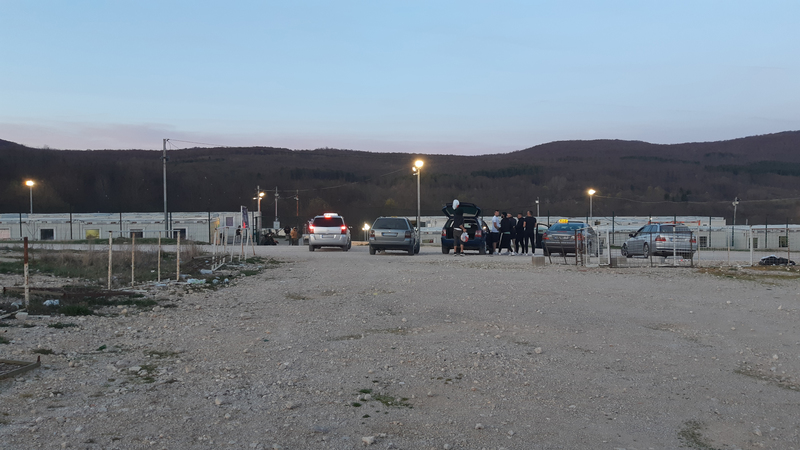Taxi
In Lipa camp, there is a steady stream of taxis taking turns to transport the encamped men to the centre of Bihać. “It's non-stop work, 24 hours a day”, as one of them told me in April 2024. Trips into town are frequent, to get supplies, to see relatives in the family camp, or to try the game. There are always one or five cars waiting to be filled: each journey costs 20 euros, so travellers try to get together to share the cost. In front of the camp, taxi business cards carpet the dirt floor.

Lipa taxis, April 2024. Photo: Morgane Dujmovic
Some drivers make no secret of the fact that they generate a very lucrative business and “use migrants for money”, in the words of one of them. Another, more measured, describes at length a not-so-profitable and rather risky business:
The fuel, the times when you don't end up in the right place, in the end you just break even. (...) Five or six years ago, if you took someone in your vehicle even as far as the bus stop, let alone to the border, they could arrest you and put you in prison; that was the case for my colleague, and I had a trial. This is the only place where they can lock you up for trafficking without you even having crossed a border!
The Bosnian legal framework has in fact made it possible to penalize the transport of illegal migrants, resulting in several prison sentences for taxi drivers. It has also largely contributed to criminalizing any type of aid given to exiles outside the channels of the authorities' partner humanitarian organizations: spontaneous actions by the local population and distributions organized by unauthorized NGOs have been repressed in various ways (administrative barriers, prosecutions, confiscation of passports, expulsion of foreign volunteers). In its 2022 report Accused of Solidarity: A Report on Incidents of Criminalisation, the Border Violence Monitoring Network reported various cases of criminalization targeting its members the previous year.
Recently, the transport of exiled persons has been governed by a decree which seems to regulate the ban in a more flexible way: transport is only tolerated in the context of the professional activity of a taxi, and the amount of the financial fine remains low enough for the activity to be considered profitable (around a hundred euros). As a result, more and more residents of Bihać have recently taken up this activity, with over a hundred new taxi licences issued by the end of 2023, as reported on the newswire on refugees of the website Courrier des Balkans.
In spite of local utilitarianism, the cordial atmosphere between some of the men encamped in Lipa and the drivers lends credence to the empathetic words I gathered: “We help them, it's for money, but we help them. They have enormous problems crossing the border. The Croatian police beat them up, take their money and phones and send them dogs. I've seen this violence first-hand”
Indeed, exiles who have been rejected at the border by the Croatian police and want to reach the official camp at Lipa have to get there on their own: either after a two-day walk, or by calling these drivers, who sometimes accept payment for their journey (around 100 euros) at a later date.
Like most of the inhabitants of Bihać, the taxi drivers thus find themselves in outposts to observe the repressive practices of the Croatian police, and the EU's control strategy on its south-eastern borders.
18/9/2025
This text is taken from the series of portfolio articles “Rivers are deadly if you're not on the right side” previously published on Mediapart, Le Courrier des Balkans, visioncarto.net and Migreurop. This series of portfolio articles is the result of field research carried out in the spring of 2024 in several South-East European countries: Croatia, Bosnia-Herzegovina, Montenegro and Albania. This publication is sent to all interlocutors met in the field. To preserve their anonymity, the exiled people are referred to here by a randomly assigned letter, with their consent.The author would like to thank the exiled people she met on these roads and along these rivers, the people from the collectives, associations, universities and institutions with whom she spoke, as well as Louis Fernier, Romain Kosellek, Eva Ottavy, Elsa Putelat and Marijana Hameršak for their invaluable contributions prior to and during this field mission.